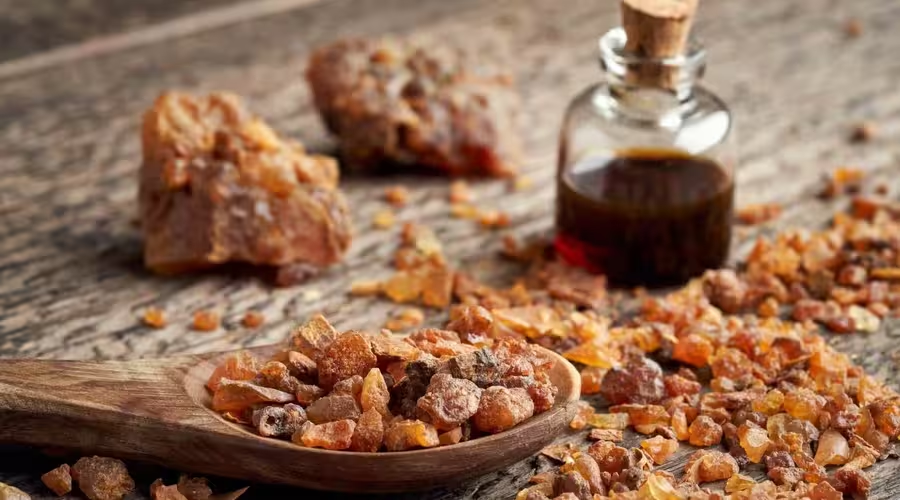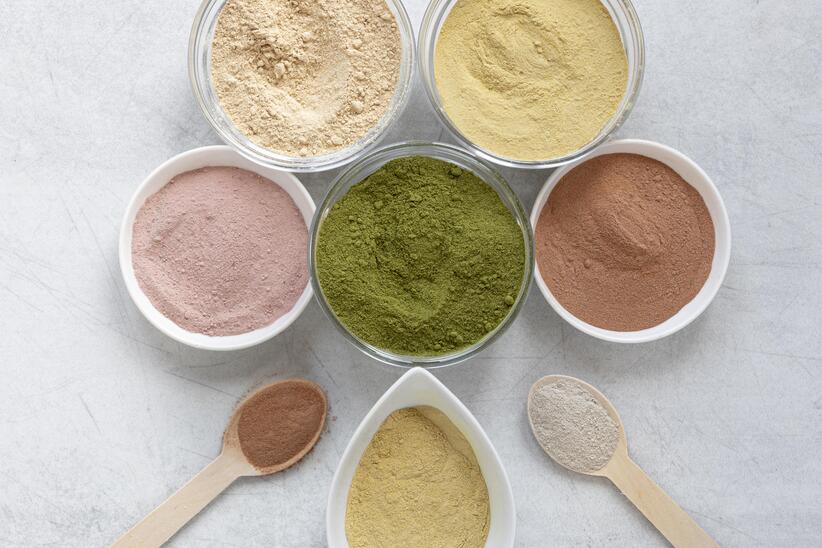Myrrh, a resin extracted from the Commiphora tree, holds an enduring legacy as one of the most valued natural substances in history. Revered for its medicinal, aromatic, and ceremonial uses, myrrh was regarded as a treasure in ancient cultures, ranking alongside gold and other precious commodities. From its role in religious rituals to its use as a potent remedy for numerous ailments, myrrh has been at the forefront of natural healing traditions. In recent years, modern science has begun to validate these historical claims, uncovering the specific compounds and mechanisms that make myrrh a powerful tool for promoting health and wellness.
In this two-part exploration, we’ll uncover the many health benefits of myrrh. Part 1 will provide a deep dive into its history, the compounds that give it its unique properties, and its most widely recognized health benefits, including antimicrobial, anti-inflammatory, and antioxidant effects.
What Is Myrrh?
Myrrh is a gum resin that oozes from the bark of Commiphora trees when their bark is wounded. These trees thrive in the arid regions of North Africa, the Arabian Peninsula, and parts of India. When the resin is exposed to air, it hardens into reddish-brown or amber-colored droplets, often referred to as “tears.”
Myrrh has a distinctive, earthy aroma that has made it a prized ingredient in perfumes, incense, and oils. However, its value extends far beyond its fragrance. The therapeutic benefits of myrrh stem from its rich composition of bioactive compounds, including:
- Sesquiterpenes: Known for their anti-inflammatory and antimicrobial properties, these compounds are responsible for many of myrrh’s healing effects.
- Terpenoids: Potent antioxidants that protect cells from damage caused by free radicals.
- Resin Acids: These compounds have significant antimicrobial and wound-healing properties, making myrrh a natural antiseptic.
Historical Significance of Myrrh
The historical importance of myrrh cannot be overstated. It has been a cornerstone of medicine, religion, and trade for thousands of years. Some key highlights include:
- Ancient Egypt:
Myrrh was a staple in Egyptian rituals. It was used in the embalming process to preserve bodies for the afterlife, and it featured prominently in temple incense blends, symbolizing purification and divinity. Egyptians also used myrrh in cosmetics and as a treatment for skin ailments. - Biblical References:
Myrrh is one of the most famous gifts presented by the Magi to the infant Jesus, signifying its great value. It is mentioned numerous times in the Bible as a key component of holy anointing oils and embalming preparations. - Traditional Chinese Medicine (TCM):
In TCM, myrrh has been used for centuries to alleviate pain, improve circulation, and treat conditions such as wounds and menstrual disorders. - Ayurveda:
Indian Ayurvedic medicine has long employed myrrh to address digestive problems, respiratory conditions, and skin diseases. - Greek and Roman Medicine:
Ancient physicians such as Hippocrates and Galen recognized myrrh’s potential, using it to treat wounds, infections, and respiratory issues.
Chemical Composition: The Secret Behind Myrrh’s Efficacy
Myrrh’s therapeutic properties are derived from its unique blend of bioactive compounds. Each compound plays a role in delivering specific health benefits:
- Sesquiterpenes: These contribute to myrrh’s anti-inflammatory and calming effects. They also enhance immune function by reducing oxidative stress in the body.
- Terpenoids: These compounds provide myrrh with its antioxidant capabilities, neutralizing free radicals and protecting cells from damage.
- Resin Acids: The primary agents behind myrrh’s antimicrobial properties, these compounds make myrrh an effective natural antiseptic for wounds and infections.
Key Health Benefits of Myrrh
1. Potent Antimicrobial Agent
One of the most well-documented benefits of myrrh is its ability to combat harmful microorganisms, including bacteria, fungi, and parasites.
- Fighting Bacteria:
Myrrh has been shown to inhibit the growth of dangerous bacteria such as Staphylococcus aureus, which can cause skin infections, and Escherichia coli, a common culprit in gastrointestinal illnesses. This makes myrrh an excellent natural alternative for treating bacterial infections. - Combating Fungal Infections:
Myrrh is particularly effective against Candida albicans, a fungus responsible for conditions like oral thrush, vaginal yeast infections, and diaper rash. Its antifungal properties make it a valuable tool in managing fungal overgrowth. - Targeting Parasites:
Research suggests that myrrh extracts may help combat parasitic infections, including Schistosoma, a parasite that causes schistosomiasis. This is especially significant for populations in tropical regions where such infections are prevalent.
2. Oral Health Benefits
Myrrh’s antimicrobial and anti-inflammatory properties make it a popular ingredient in oral care products.
- Gingivitis and Periodontitis:
Myrrh helps reduce inflammation, swelling, and bleeding in the gums, effectively preventing and managing gum disease. - Healing Mouth Ulcers:
The soothing and antiseptic properties of myrrh can alleviate the pain of canker sores and promote faster healing. - Fresh Breath:
Myrrh’s ability to combat odor-causing bacteria makes it an excellent natural remedy for bad breath.
3. Anti-Inflammatory Effects
Chronic inflammation is a key driver of many health conditions, including arthritis, heart disease, and autoimmune disorders. Myrrh’s bioactive compounds help modulate the body’s inflammatory response.
- Arthritis Relief:
By reducing inflammation in the joints, myrrh can provide significant relief from pain and stiffness associated with arthritis. - Skin Inflammation:
Topical application of myrrh can calm irritated skin, reducing redness, itching, and discomfort caused by eczema, dermatitis, or minor rashes.
4. Antioxidant Properties
The antioxidants in myrrh play a critical role in protecting the body from oxidative stress, a condition that leads to cellular damage and accelerates aging.
- Protecting Against Chronic Disease:
Myrrh’s antioxidants neutralize harmful free radicals, reducing the risk of conditions such as cancer, heart disease, and neurodegenerative disorders. - Promoting Healthy Skin:
Regular use of myrrh-based skincare products can improve skin elasticity, minimize wrinkles, and enhance overall complexion by protecting skin cells from damage.
Modern Applications of Myrrh
While myrrh has ancient roots, its uses are far from outdated. Today, it is available in various forms tailored to specific needs:
- Essential Oil:
Myrrh oil is a staple in aromatherapy, prized for its calming effects and ability to enhance focus and relaxation. It’s also used in massage blends to soothe sore muscles and joints. - Tinctures and Capsules:
Myrrh is available in supplement form, taken orally to support immunity, digestion, and hormonal balance. - Topical Preparations:
Myrrh is a common ingredient in creams, ointments, and balms for wound healing and skin care. - Oral Care Products:
Toothpastes, mouthwashes, and gum powders enriched with myrrh help maintain oral hygiene and freshen breath.
Advanced Health Benefits of Myrrh
1. Hormonal Balance and Women’s Health
Myrrh has been used for centuries in traditional medicine to support women’s reproductive health. Its bioactive compounds can influence hormone levels and alleviate common issues related to menstrual and menopausal health.
- Menstrual Relief:
Myrrh is a natural emmenagogue, meaning it can help regulate menstrual cycles. Its anti-inflammatory properties reduce pain and cramping associated with menstruation. Traditional remedies often included myrrh to soothe discomfort caused by heavy periods or irregular cycles. - Hormonal Balance During Menopause:
The resin’s ability to reduce inflammation and improve circulation can also alleviate symptoms of menopause, such as mood swings, hot flashes, and joint discomfort. - Uterine Health:
Myrrh has been used in traditional therapies to promote uterine health, supporting recovery after childbirth and reducing inflammation in the reproductive organs.
2. Mental Well-Being and Stress Relief
Myrrh is highly valued in aromatherapy for its ability to promote mental clarity and emotional balance.
- Stress Reduction:
The earthy, grounding scent of myrrh essential oil has calming effects on the nervous system, helping to reduce stress, anxiety, and mild depression. The sesquiterpenes in myrrh are believed to act on the limbic system, the brain’s emotional center, promoting relaxation. - Enhanced Meditation and Spiritual Practices:
Used in sacred rituals for centuries, myrrh’s aroma is thought to enhance meditation, focus, and a sense of spiritual connection. Burning myrrh as incense or diffusing its essential oil can create a serene environment conducive to mindfulness practices. - Combating Mental Fatigue:
Myrrh oil is often included in blends designed to combat fatigue and enhance concentration, making it a useful tool for individuals experiencing burnout or low energy levels.
3. Wound Healing and Skin Regeneration
One of myrrh’s most celebrated uses in ancient and modern medicine is its role in wound care. Its antimicrobial and anti-inflammatory properties make it an effective natural remedy for skin injuries.
- Accelerated Healing:
Myrrh contains compounds that stimulate the regeneration of skin cells, promoting faster healing of cuts, burns, and abrasions. - Antiseptic Action:
When applied topically, myrrh helps protect wounds from bacterial and fungal infections, reducing the risk of complications such as delayed healing or scarring. - Reducing Scars and Stretch Marks:
Regular application of myrrh oil can improve skin elasticity and texture, making it a popular choice for reducing the appearance of scars, stretch marks, and wrinkles. - Soothing Chronic Skin Conditions:
Myrrh is often used to alleviate symptoms of eczema, psoriasis, and acne. Its ability to reduce redness, itching, and inflammation makes it a natural choice for sensitive or irritated skin.
4. Anticancer Potential
Recent studies have explored myrrh’s potential as an adjunct therapy in cancer treatment. Its bioactive compounds exhibit promising anticancer properties.
- Apoptosis Induction:
Myrrh contains terpenoids that can trigger apoptosis, or programmed cell death, in cancer cells. This mechanism is crucial in stopping the proliferation of malignant cells. - Inhibition of Tumor Growth:
Research has shown that myrrh extracts may slow the growth of certain cancers, including breast, prostate, and colon cancers. - Synergistic Effects with Conventional Therapies:
Some studies suggest that myrrh may enhance the efficacy of chemotherapy and radiation by improving the immune system’s response and reducing oxidative stress caused by treatments.
While these findings are promising, more research is needed before myrrh can be fully integrated into mainstream cancer therapies.
Practical Tips for Using Myrrh
1. Aromatherapy
Myrrh essential oil is a popular choice for creating a calming and therapeutic atmosphere.
- Diffusion:
Add 5–10 drops of myrrh oil to a diffuser to promote relaxation, relieve stress, and enhance focus. - Massage Blends:
Combine myrrh oil with a carrier oil like coconut or jojoba oil for a soothing massage that relieves tension and improves circulation. - Inhalation:
Add a few drops of myrrh oil to a bowl of steaming water, cover your head with a towel, and inhale deeply for relief from respiratory issues and mental fatigue.
2. Oral Care
To harness myrrh’s antimicrobial benefits for oral health:
- Mouthwash:
Mix 1–2 drops of myrrh oil with warm water and swish it around your mouth for 30 seconds to prevent gum disease and freshen breath. - Toothpaste:
Add a small amount of myrrh powder or oil to your toothpaste for an antimicrobial boost. - Gum Relief:
Apply a diluted solution of myrrh oil directly to inflamed gums for immediate soothing and healing.
3. Skin Care
Myrrh is a powerful addition to any skincare routine:
- Facial Serums:
Add a few drops of myrrh oil to your moisturizer or serum to reduce fine lines and improve skin elasticity. - Wound Care:
Apply a diluted solution of myrrh oil directly to cuts or abrasions to accelerate healing and prevent infection. - DIY Masks:
Mix myrrh powder with honey or yogurt for a hydrating and antimicrobial face mask that revitalizes the skin.
4. Internal Use
Myrrh tinctures and capsules are available for internal consumption, but these should always be used under professional guidance.
- Digestive Health:
A myrrh tincture can be diluted in water and consumed to alleviate indigestion and bloating. - Immune Boosting:
Myrrh supplements can help strengthen the immune system, especially during cold and flu seasons.
Safety and Precautions
While myrrh is generally safe when used appropriately, it’s essential to take some precautions:
- Dilution is Key:
Always dilute myrrh essential oil with a carrier oil before applying it to the skin to prevent irritation. - Avoid During Pregnancy:
Myrrh can stimulate uterine contractions and should be avoided during pregnancy unless recommended by a healthcare provider. - Allergic Reactions:
Perform a patch test before using myrrh oil or resin, especially if you have sensitive skin. - Dosage Matters:
When consuming myrrh internally, adhere to recommended dosages, as excessive consumption can lead to side effects such as gastrointestinal upset.
Parting Thoughts
Myrrh’s long history as a symbol of healing and sacredness is a testament to its powerful health benefits. From supporting women’s health and enhancing mental clarity to healing wounds and offering potential cancer-fighting properties, myrrh is a natural remedy worth incorporating into your wellness routine.
However, as with any natural remedy, moderation and proper use are key. By understanding its benefits and applications, you can safely harness the therapeutic power of myrrh to enrich your health and well-being.




